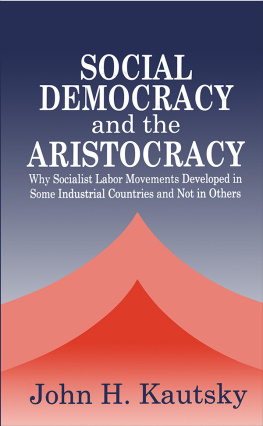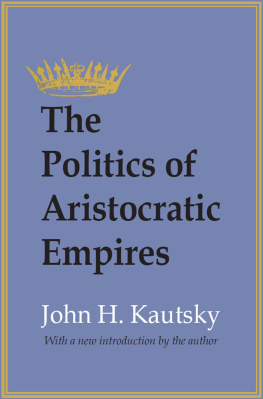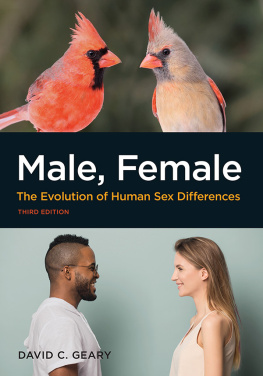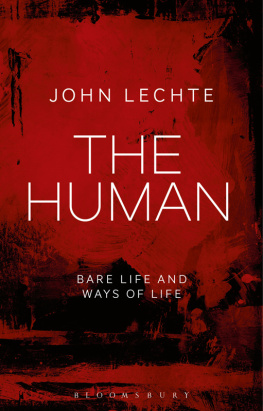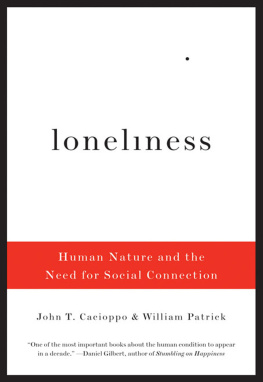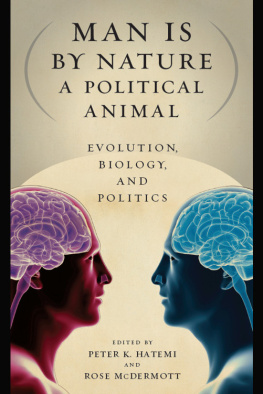First published 1988 by Transaction Publishers
Published 2017 by Routledge
2 Park Square, Milton Park, Abingdon, Oxon OX14 4RN
711 Third Avenue, New York, NY 10017, USA
Routledge is an imprint of the Taylor & Francis Group, an informa business
Copyright 1988 by Taylor & Francis
All rights reserved. No part of this book may be reprinted or reproduced or utilised in any form or by any electronic, mechanical, or other means, now known or hereafter invented, including photocopying and recording, or in any information storage or retrieval system, without permission in writing from the publishers.
Notice:
Product or corporate names may be trademarks or registered trademarks, and are used only for identification and explanation without intent to infringe.
Library of Congress Catalog Number: 87-19149
Library of Congress Cataloging-in-Publication Data
Fleming, Thomas, 1945-
The politics of human nature.
Bibliography: p
Includes index.
1. Political psychology. I. Title.
JA74.5.F55 1987 320.019 87-19149
ISBN: 1-56000-693-5
ISBN-13: 978-1-5600-0693-0 (pbk)
ISBN-13: 978-0-88738-189-8 (hbk)
I began thinking about the roots of political behavior in the late 1970s, under the influence of Maines Ancient Law, Aristotles Politics, and Filmers Patriarchal all of whom approached political theory in a manner strikingly different from the main stream of Locke, Rousseau, and Bentham. Classical political theory since the time of Hobbes, I thought, took far too much for granted, and those easy assumptions about natural equality and human rights had led to a dead end in theory and to disastrous consequences in practice. What was wanted was a less a priori approach that began with man as he is rather than with the impossibly simple creature of Utopian fantasies.
I began working in earnest, about 1980, on the problem of equality but made little progress until I took the suggestion of two former colleagues and started reading Edward O. Wilsons Sociobiology and Evans-Pritchards studies of the Nuer, a people of the Sudan who came to seem more familiar than my neighbors. It was at that point I realized with some horror that no book, such as I had in mind, could be completed without a thorough investigation of what the social sciences and evolutionary biology had to say on the subject of human nature. Rejecting the larger claims of evolutionary theory and skeptical of the utility of much sociology and psychology, I began to recognize that several generations of patient, sometimes brilliant researchers had succeeded in amassing a wealth of evidence to document Aristotles definition of man as the political animal. If I have not always succeeded in integrating the finding of multifarious disciplines into a coherent whole, it may be that success lies beyond the reach of a classicist and literary essayist.
The work was begun in a small village of South Carolina, and it was not until 1984 that a summer teaching position at the University of Colorado gave me the use of a research library. Since then much of the necessary reading was carried out at the University of Wisconsin at Madison, whose superb library is among the glories of the Middle West. During the entire period I neither applied for nor received any fellowship, grant, or stipend to support research or composition. No graduate assistant helped in the preparation of notes or even in the xeroxing of articles. What mistakes there are are due entirely to my own carelessness and ineptitude.
If no direct financial aid was given, my position at The Rockford Institute did afford me sufficient free time to work on the project. Special thanks are due to Anita Fedora for her tireless labor in preparing the manuscript and to Michael Warder for his effort to make sure that it saw the light of day. A number of people have read various parts of the work and made invaluable suggestions: Edward O. Wilson, Robert Nisbet, Stephen R.L. Clark, Thomas Molnar, Grace Goodell, Allan Carlson, Bryce Christensen, and Charles F. Thompson. To all of them I owe a debt of gratitude. Finally, it is to my wife and children, who endured these years of unremunerative labor and an unremitting disruption of family life, that this book is affectionately dedicated.
1
The Part and the Whole
The collapse of Roman authority in the West created a crisis from which political thinking has never quite recovered. The eternal city, settled by the descendants of Trojan Aeneas (Venus son), the center of empire, was the one permanent fact in a stable world. The world had been at peace, united in a single language (Latin) that conveyed an entire civilization that was both Latin and Greek. A man could travel from Hadrians Wall in Britain all the way to Egypt and still be bound by the same Roman law.
In the fifth century, most of the European part of the empire fell apart. After the sack of Rome in 410, a bewildered Augustine attempted to shift the blame from the impious Christians to the pagan Romans, but that meant, in effect, denying the divinity of Roman civilization. Augustines Civitas Dei was only the first effort to create a substitute for imperial Rome. After the Western Empire crumbled into the fragments that were reassembled into the nations of Europe, one after another, the great powers attempted to restore the imperial unity. Charlemagne made himself emperor in 800, inaugurating the fantasy of the Holy Roman Empire. The Bourbons in France, the Romanovs in Russia, and the Hapsburgs in Austria made claim to the ancient glory of one kingdom, one leader, and their pretensions were revived by Napoleon, Lenin, and Hitler. But unity remained a dream or, more recently, turned into a nightmare. The casualties of universalist aspirations have been staggering, but after two world wars, the rise of socialism (and national socialism), and forty years of sparring between two churches militant democracy and Marxism the world is no more one than it was in 1914. Separatist and nationalist movements disturb the peace of Britain, France, and Spain, while both the United States and the Soviet Union have a hard time holding together their races, nationalities, ethnic groups, religions, and classes into two gigantic bundles.
The creation of unity is not simply a matter of geopolitical tinkerings or thinly disguised imperialism. By nature, human beings are fond of seeking simple answers to complex questions. There is no point in complaining about reductionism or oversimplification. We are what we are. All men by nature are eager to know, as Aristotle began his Metaphysics, and since all knowledge requires selection, discrimination, and simplification, we are eternally condemned to imposing our partial and imperfect solutions on the entire universe of problems.
Not all simplifications are harmful. Without arithmetic, geometry, and logic we could not progress very far in analytical thought, and without political abstractions like sovereignty or liberty, legal systems would not get much beyond the notion of custom. The danger lies not so much in simplistic analysis itself but in the application of political abstractions into real situations. Terms like democracy and equality turn into slogans, and slogans become rallying cries in a crusade against complexity.


